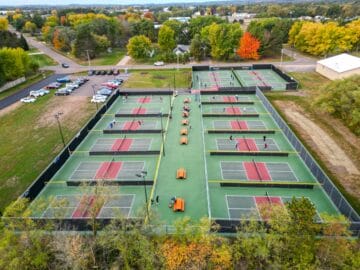
July 25, 2023
MANITOWOC – Pollution clean-up at a handful of beaches and marinas throughout Northeast Wisconsin has officially begun – thanks in part to a commitment from Meijer to help the Great Lakes stewardship.
On July 12, faculty and students of the University of Wisconsin-Oshkosh’s Environmental Research and Innovation Center (UWO’s ERIC), as well as representatives for Meijer, the Council of the Great Lakes Region (CGLR) and the City of Manitowoc, at Manitowoc Marina (425 Maritime Dr.) gathered to watch the launch of three litter capture devices: the BeBot, Pixie Drone and Seabin.
Lora Shrake, senior program director of business & sustainability at CGLR, said the equipment is part of the Great Lakes Plastic Cleanup initiative.
“Our models are showing that roughly 22 million pounds of plastic could be entering the lakes every year,” she said. “We know 80% of the waste that’s found on the shoreline is plastic.”
The devices will be deployed at Manitowoc Marina, Blue Rail Beach, Kohler Andrae State Park, Sunset Park Beach and 14 other marinas across the Great Lakes in Wisconsin.
“We’re here to look at some unique technology, and to my knowledge, the most comprehensive technology for marine debris in one place – certainly in Wisconsin – but maybe even in the Great Lakes,” Greg Kleinheinz, director of UWO’s ERIC, said. “I’m proud UW-Oshkosh is here, and we appreciate the partnership with both the Council for the Great Lakes Region (and) Meijer.”
The BeBot, Kleinheinz said, sifts through an inch of sand on the beaches to collect plastics and other pollutants.
The Pixie Drone works similarly to the BeBot, but collects pollutants in the water instead.

The Pixie Drone is a water-borne robot that collects pollutants in beaches and marinas. Rachel Sankey Photo
And the Seabin, Kleinheinz said, is similar to a pool skimmer, and sits on the surface of the water to collect litter.
“Once collected, the litter is sorted and characterized to help us understand what is washing up, and maybe what those sources and pathways are so we can try to understand the root of that problem and tackle that issue,” Shrake said.
Brandon Harrison, store director for Meijer in Manitowoc, said Meijer’s mission to help the environment spans several decades.
“Fred Meijer… spoke at the first Earth Day celebration in Grand Rapids on April 22, 1970,” he said. “Ever since, we’ve integrated environmental sustainability into our daily operations… it aligns with our core values and the mission of enriching lives and the communities we serve. (The Great Lakes) are a privilege we don’t take for granted, which is why we believe in the responsibility to protect them.”
Courtney Hansen, director of tourism for the City of Manitowoc, said today there is a larger focus on protecting and highlighting the state’s natural resources.
“In recent years, Travel Wisconsin, our state tourism department, has challenged us and put an emphasis on how we’re taking care of our community and how we’re highlighting and protecting our greatest assets – which are our trails, our beaches and our waterways,” she said. “I’m really proud to be able to have this technology in our community and make sure our greatest asset is beautiful now and for years to come.”
Sidebar:
Want to see the BeBot in action?
Head to TheBusinessNews.com to see the remote-controlled land robot sift through sand at the Manitowoc Marina picking up plastics and other pollutants.
You can also read more about the Great Lakes Plastic Cleanup initiative and the role UWO and Meijer has had in supporting it, at TheBusinessNews.com.
 West Central Wisconsin is in a ‘pickle’
West Central Wisconsin is in a ‘pickle’ Farm-fresh meats raised responsibly at Huhta Homestead
Farm-fresh meats raised responsibly at Huhta Homestead








